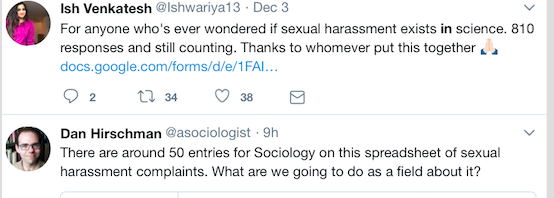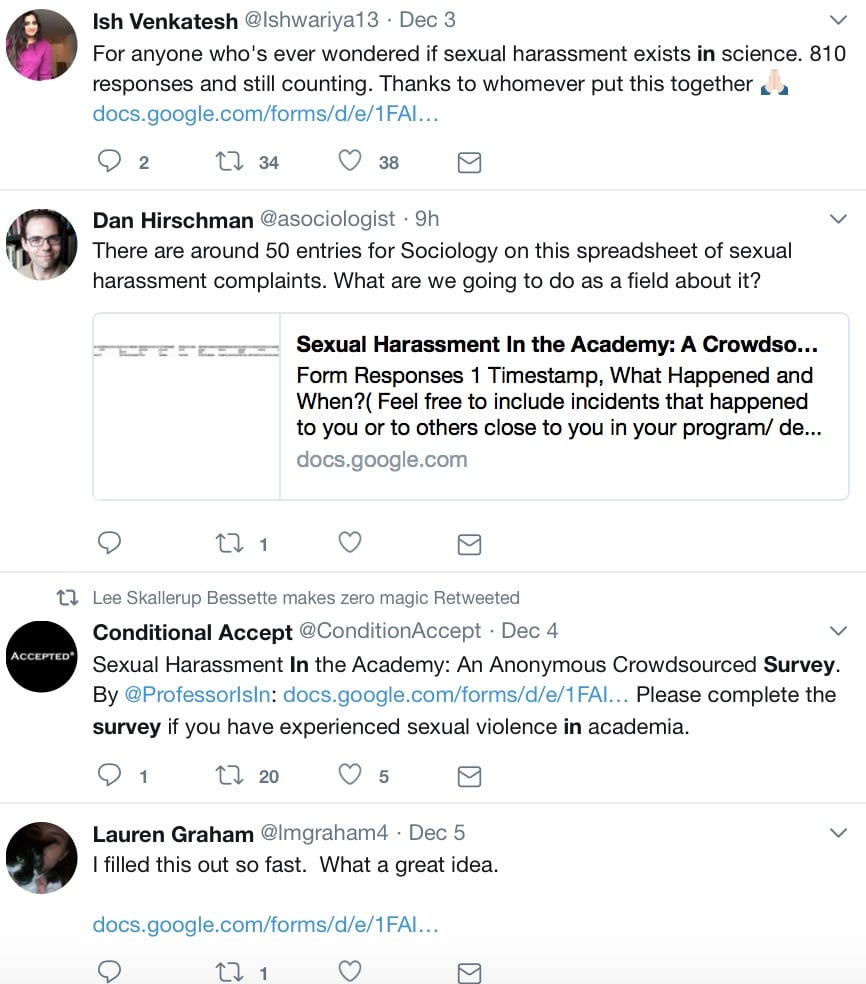You have /5 articles left.
Sign up for a free account or log in.

=
If harassers weren’t already on notice before this year, they are now. But while there’s increased awareness of sexual misconduct within academe, the phenomenon remains understudied. It’s unclear, for example, just how many students -- especially graduate students -- and faculty members are affected. Also unclear is whether incidences of harassment have decreased of late, even if reports have increased (if indeed they have).
A new crowdsourced survey of experiences with sexual harassment in academe doesn’t seek to answer those questions in a scientific way. But the survey and its 1,200-and-counting entries are attracting attention across higher education for illuminating an ongoing problem in ways that statistics alone could not.
Some of the accounts are immediately shocking, describing legal descriptions of assault -- “A professor wrote me a letter of recommendation for the job market and then stuck his tongue down my throat” -- while others are more subtle. A self-identified department chair at an elite institution described how her first writing mentor as an undergraduate praised and encouraged her for two years before inviting her out and hitting on her as he consoled her about a family loss. From then on, she wrote, “every gesture, any ‘standing too close,’ any compliment all changed tone. All the ‘support’ changed tone … I felt lost. What a strange thing to have to view one’s physical self as an intellectual impediment.”
Some accounts reek of injustice, such as that by a former tenure-track professor who said her notoriously sexist department chair had been encouraged to recruit a female professor prior to her hire, and then constantly criticized her -- in contrast to the regular external praise she received. She left her campus after the experience, accepting a settlement from the university over an offer of reinstatement to the same situation.
All of the accounts are linked in that they suggest abuses of power, along with the residual slow burn of having years if not decades of academic work undermined in moments.
Karen Kelsky, a former tenured professor who runs the academic job consulting business The Professor Is In and a blog of the same name, started the online survey last week. It includes questions on what happened and when, what the harasser’s gender and position relative to the victim were at the time (professor, etc.), institution type and field, institutional responses and career consequences for the harasser (if any), and the impact of harassment on the career and health of the person who experienced it.
Respondents were not required to answer all questions, and Kelsky made clear that while responses would be stripped of names, all other information would be freely available online.
“I leave the definition of ‘sexual harassment’ open; you may share anything that you feel merits inclusion here,” she wrote. “My goal here is to make visible the unacknowledged scope and scale of the problem of sexual harassment in academic settings in the aggregate -- with complete anonymity for all who participate. I will make no effort to use this information for any purpose except to increase public awareness on my blog. I will make no effort to identify the contributors or the actors in their stories in any way.”
Responses poured in, from students, professors, former academics and other researchers alike. The survey got a major boost from social media, where it was shared enthusiastically by many, often accompanied by the hashtag #MeTooPhD -- a riff on the broader #metoo sexual harassment awareness campaign. Some of those who didn’t personally respond also took the survey as a call to action on reform, for their disciplines or academe in general.

Kelsky said Thursday that she created the survey to “give victims a place to share their stories, to know they are not alone and to realize the systemic, institutional and patterned nature of sexual abuse in the academy.” She said she hoped men felt a bit uncomfortable reading and that they'd "closely examine" their own behavior, as well as that of their colleagues. She added via email, “You cannot solve a problem if you can't see it. This survey aims to make the problem visible to all.”
Reading all the submissions revealed major themes, including what Kelsky described as the pervasiveness and severity of abuse, extending to rape and stalking. The “systematic protection” of abusers over victims, stood out, too, demonstrating the "sheer force of patriarchal solidarity in keeping powerful men safe and insulated from consequences," she said. There are also recurrent, “devastating” consequences for women -- and the academy, in terms of women’s lost contributions when they grapple with harassment.
“Countless women on the survey describe being hounded out of the Ph.D. entirely, being forced to change projects or advisers or institutions, resulting in disrupted work and loss of funding and continuity," Kelsky said. She noted that some accounts describe having hidden out in closets or empty rooms to avoid a harasser.
Robin Nelson, an assistant professor of biological anthropology at Santa Clara University, co-wrote two peer-reviewed studies -- one this year -- based on surveys on harassment at scientific field sites. Nelson said she wished she was surprised by Kelsky’s findings, but that she wasn’t, based in part on her own work.
“In institutional structures that are set up so one individual has power over the career trajectory of another, there’s always the possibility of abuse,” Nelson said. “So I’m not really surprised, just saddened by how many folks have had to manage this as they make their way through the beginning of their careers.”
Nelson said she worried, to a degree, that the design of Kelsky’s study could put respondents -- especially those in smaller fields -- at risk of being identified, and therefore retaliated against. The point has been raised on social media, with others arguing against it. (Kelsky in an interview reiterated that the study was not scientific but rather sought to “hold space” for those who have experienced harassment. She also suggested that it was “infantilizing” to assume academics don’t understand the concept of informed consent.)
Yet Nelson said the study holds value in it's easy to see similarities between experiences, cutting through the false perception of isolation many victims feel. Over all, she said, academe is still at the beginning of the road to reform. Clear rules against harassment are important, she said, but attitudes about those rules need to shift, as well.
“We are incredibly tolerant of people who have broken the rules and allow them, in many cases, to remain in our midst for different reasons -- they hold a lot of social capital, or we consider them geniuses or incredibly bright,” Nelson said. “We have got to stop valuing individual scholars over the physical safety and mental health of everyone in our field.”
Kelsky echoed that idea, saying that when people “bemoan the loss of the contribution of Famous Man X, they are ignoring the loss of contribution of the five or 25 or 50 or more women he harassed out of the field entirely.”









